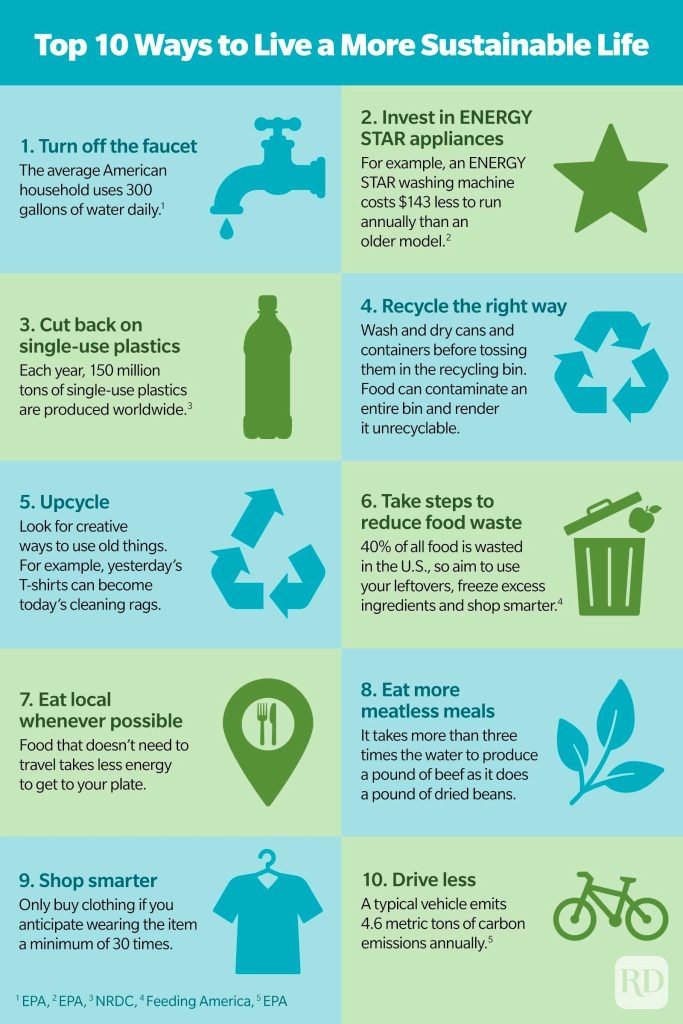Living a more eco-friendly lifestyle is not only beneficial for the environment, but it can also greatly improve the quality of our lives. By making small changes to our everyday habits, we can contribute to a more sustainable future while enjoying the benefits of a healthier planet. In this blog post, I will share some personal insights and practical tips on how to embrace eco-friendly habits for sustainable everyday living.
1. Reduce, Reuse, Recycle: We’ve all heard this mantra before, but sometimes it’s easier said than done. However, by consciously making an effort to reduce our consumption, reuse items, and recycle whenever possible, we can significantly minimize our ecological footprint. I’ve started carrying a reusable water bottle and shopping bag with me everywhere I go. These small changes have made a big difference in reducing single-use plastic waste in my day-to-day life.
2. Embrace Plant-Based Eating: Transitioning to a plant-based diet is not only a healthier choice for our bodies but also for the environment. Animal agriculture is a major contributor to greenhouse gas emissions and deforestation. By incorporating more plant-based meals into our diets, we can help reduce our carbon footprint and promote sustainability. Personally, I started by dedicating one day a week to eating plant-based meals and gradually increased it to several days. Not only have I noticed improvements in my health, but I also feel good knowing that I’m making a positive impact on the planet.
3. Conserve Energy: One of the simplest and most effective ways to reduce our environmental impact is to conserve energy. Turning off lights when leaving a room, unplugging electronics when not in use, and using energy-efficient appliances are small changes that can add up to significant savings. Personally, I installed LED light bulbs in my home, programmed my thermostat to optimize energy usage, and made it a habit to unplug devices when they’re fully charged. These habits not only help the environment but also lower my electricity bills.
4. Opt for Sustainable Transportation: Transportation is a major contributor to greenhouse gas emissions. By choosing more sustainable modes of transportation, like walking, biking, or using public transport, we can reduce our carbon footprint. When a car is necessary, carpooling or investing in an electric or hybrid vehicle can make a difference. Personally, I started biking to work a few days a week, and not only have I reduced my emissions, but I have also discovered the joy of incorporating exercise into my daily routine.
5. Embrace Minimalism: Living a minimalist lifestyle is not only trendy but also environmentally friendly. Instead of constantly buying new things, we can focus on making do with less and only purchasing items that are truly essential. By reducing our consumption, we decrease the demand for unnecessary production, which in turn conserves resources and reduces waste. Personally, I have decluttered my living space, donated items I no longer needed, and now before making a purchase, I ask myself if it’s something I truly need or just a passing want.
6. Support Sustainable Brands: When we invest in products from sustainable and ethical brands, we are rewarding companies that prioritize the environment and fair labor practices. By doing some research and supporting eco-friendly brands, we can help drive the market towards a more sustainable future. Personally, I’ve made an effort to educate myself about sustainable clothing brands and have shifted my shopping habits to invest in clothing made from organic and recycled materials.
7. Grow your own Food: Growing your own food, even if it’s just a few herbs or vegetables, is a rewarding and sustainable practice. Not only does it reduce the carbon footprint associated with shipping and packaging, but it also allows you to have control over the pesticides and fertilizers used. Even if you don’t have a garden, you can grow herbs in small pots on your windowsill. Personally, I started a small vegetable garden in my backyard, and there’s something incredibly satisfying about eating the food I’ve grown with my own hands.
8. Share and Borrow: Instead of buying new items that we may only need temporarily, consider sharing or borrowing from friends or neighbors. Whether it’s tools, kitchen appliances, or even books, sharing resources reduces waste and saves money. Personally, I’ve joined a local tool-sharing program and have borrowed various tools that I didn’t want to invest in for one-off projects. It’s a win-win situation where we can save money while promoting sustainability.
Embracing these eco-friendly habits has not only made me feel more connected to the environment but has also enriched my life in many ways. By living more sustainably, I have discovered new hobbies, improved my health, reduced clutter, and saved money. Making eco-friendly choices isn’t about denying ourselves the things we enjoy; it’s about finding a balance between our needs and the needs of the planet.
Remember, even small changes can make a significant impact when multiplied by millions of people. So let’s come together and make a conscious effort to adopt these eco-friendly habits for a more sustainable future. Our planet and future generations will thank us.

